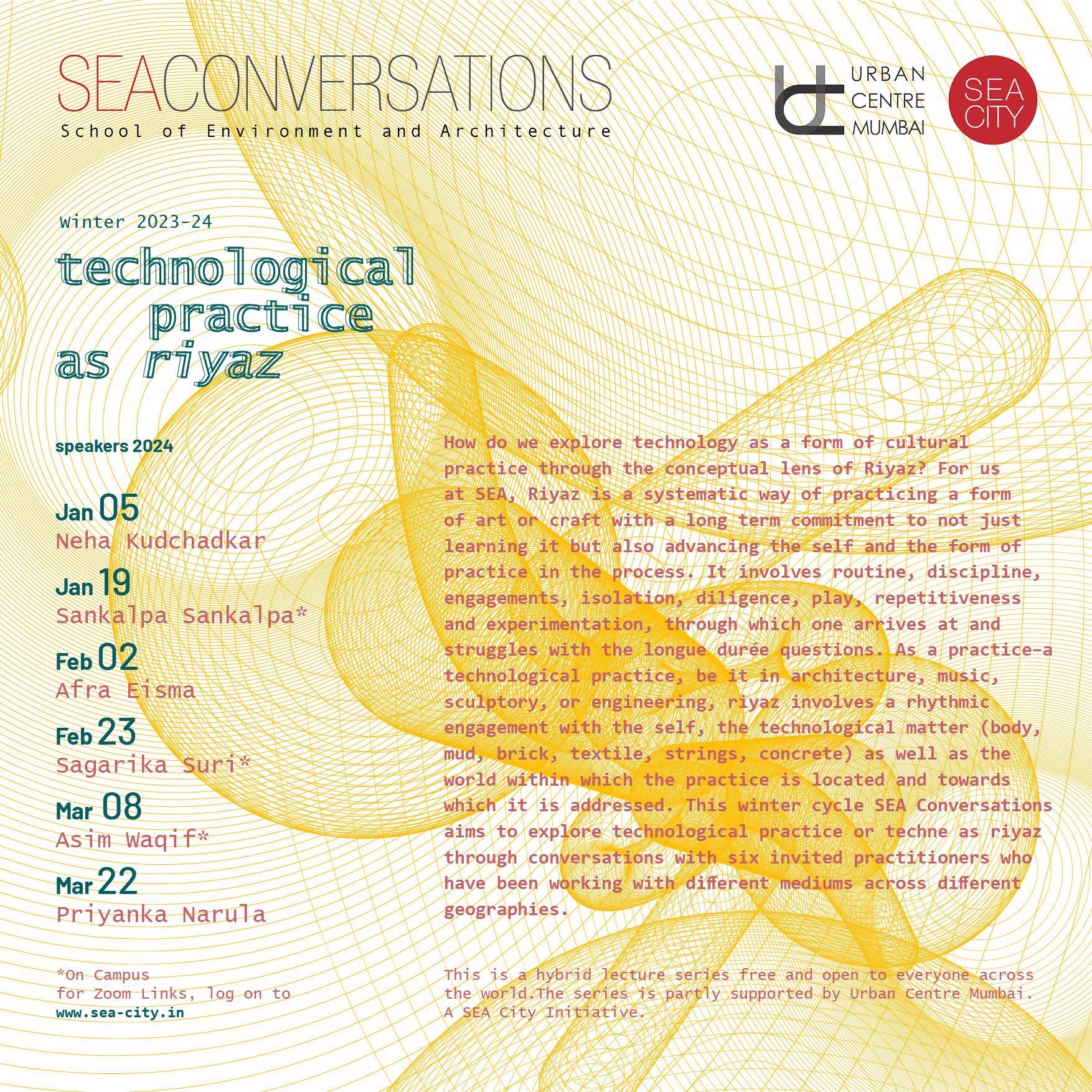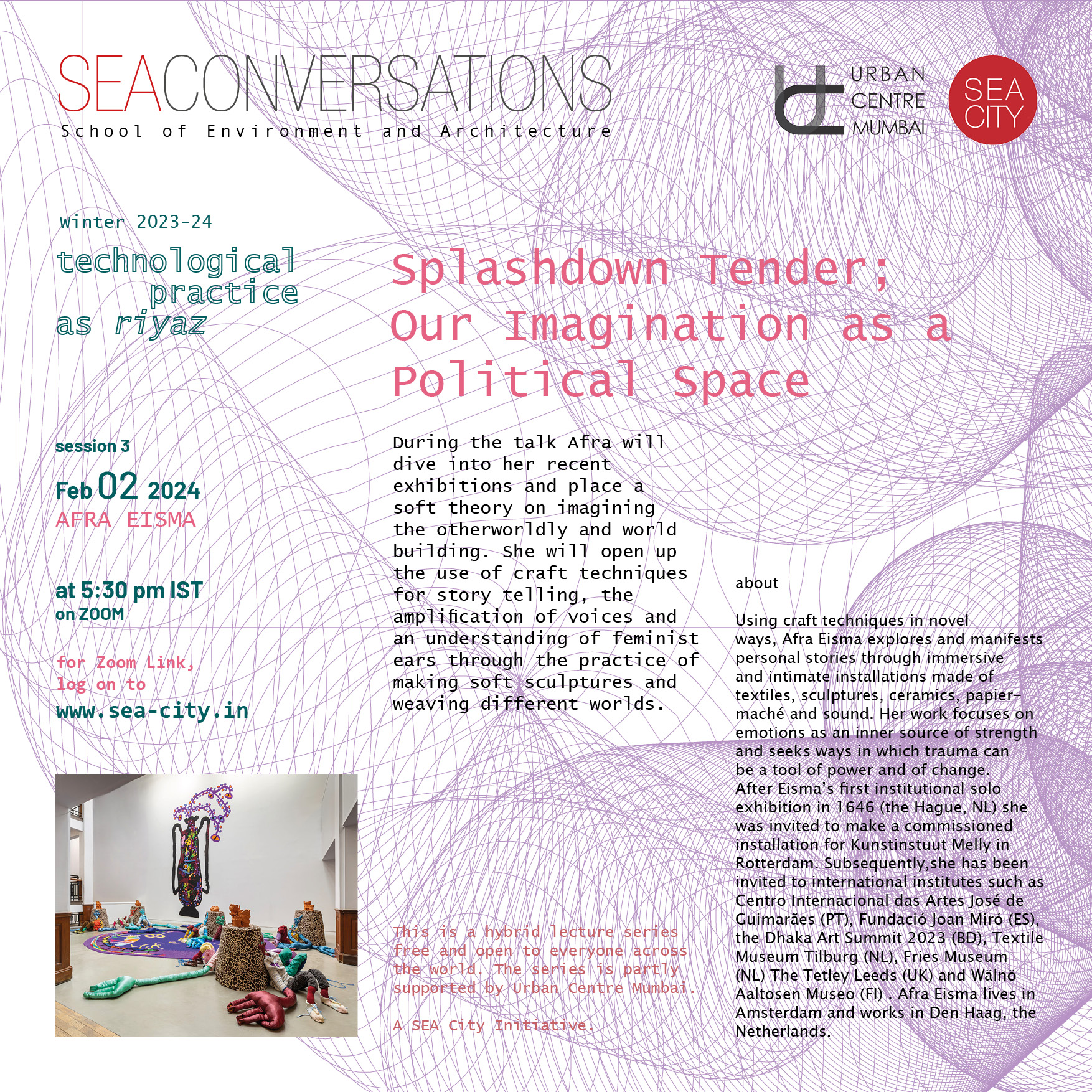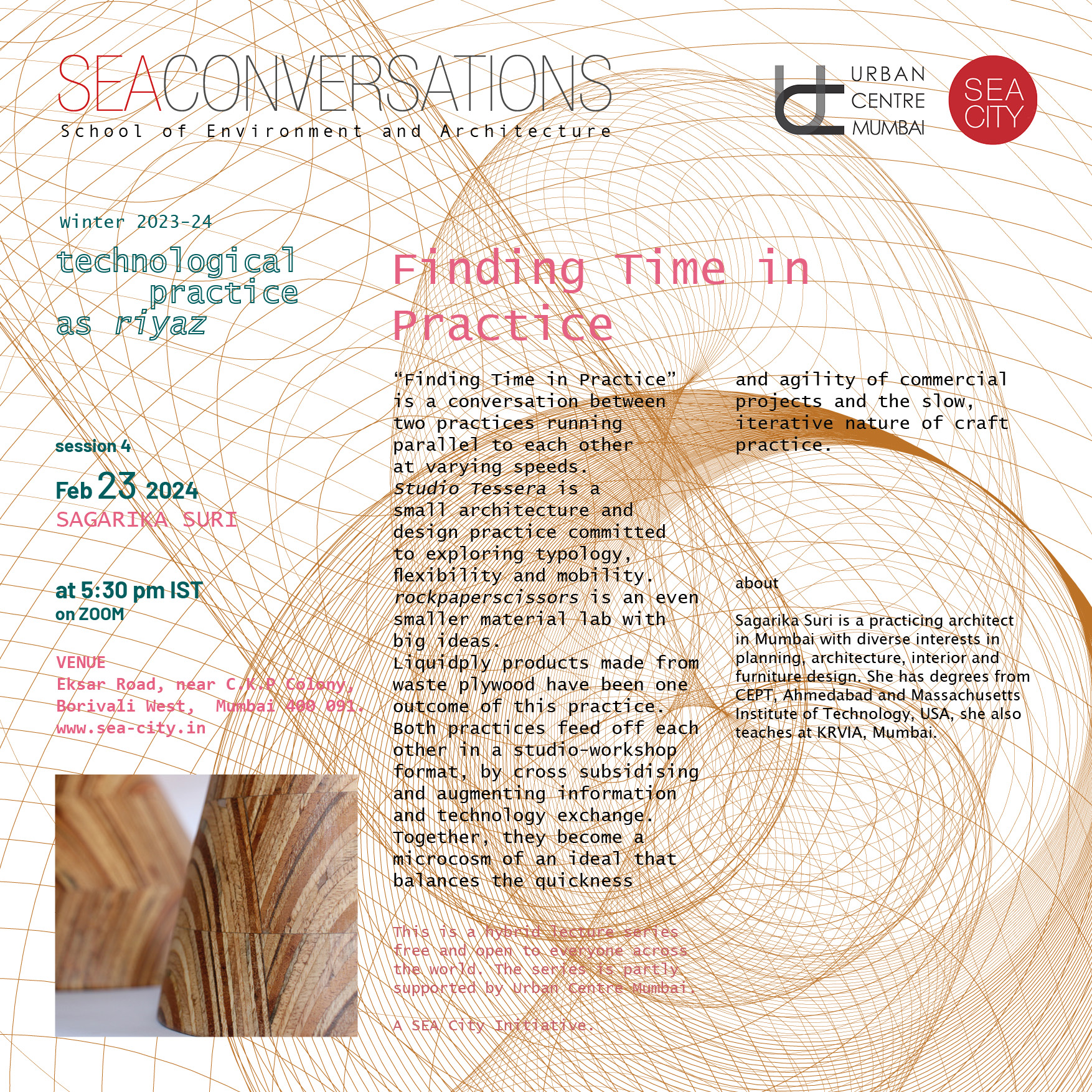NEXT on SEA Conversations
Winter 2023-24
Technological Practice as Riyaz
How do we explore technology as a form of cultural practice through the conceptual lens of Riyaz? For us at SEA, Riyaz is a systematic way of practicing a form of art or craft with a long term commitment to not just learning it but also advancing the self and the form of practice in the process. It involves routine, discipline, engagements, isolation, diligence, play, repetitiveness and experimentation, through which one arrives at and struggles with the longue durée questions. As a practice–a technological practice, be it in architecture, music, sculpture, or engineering, riyaz involves a rhythmic engagement with the self, the technological matter (body, mud, brick, textile, strings, concrete) as well as the world within which the practice is located and towards which it is addressed.
This winter cycle SEA Conversations aims to explore technological practice or techne as riyaz. We ask: In riyaz, how does one engage with matter (molding, sculpting, weaving, screwing, ramming, kneading), which is not just material but also emotions, experiences, memories, histories, dreams and desires? What kinds of rhythms are devised between the practitioner, the matter, and the world in this practice of engagement? What kinds of routines, repetitions, and intensities constitute these rhythms? How does the material and the immaterial, shape the process and the rhythms? What kinds of asymmetries, imperfections, and unexpectedness emerge in this process? And what role do they play? How does the larger world, including the fields of art and architectural practices, within which the practice is located shape the riyaz? And lastly, how does the conceptual lens of techne as riyaz allow us to rethink the given notions of technology in the field of architectural practice and pedagogy? We explore these questions through conversations with six invited practitioners who have been working with different mediums across different geographies.
speakers 2024
Jan 05 Neha Kudchadkar
Jan 19 Sankalpa Sankalpa*
Feb 02 Afra Eisma
Feb 23 Sagarika Suri*
Mar 08 Asim Waqif*
Mar 22 Priyanka Narula
*sessions on campus
Technological Practice as Riyaz
How do we explore technology as a form of cultural practice through the conceptual lens of Riyaz? For us at SEA, Riyaz is a systematic way of practicing a form of art or craft with a long term commitment to not just learning it but also advancing the self and the form of practice in the process. It involves routine, discipline, engagements, isolation, diligence, play, repetitiveness and experimentation, through which one arrives at and struggles with the longue durée questions. As a practice–a technological practice, be it in architecture, music, sculpture, or engineering, riyaz involves a rhythmic engagement with the self, the technological matter (body, mud, brick, textile, strings, concrete) as well as the world within which the practice is located and towards which it is addressed.
This winter cycle SEA Conversations aims to explore technological practice or techne as riyaz. We ask: In riyaz, how does one engage with matter (molding, sculpting, weaving, screwing, ramming, kneading), which is not just material but also emotions, experiences, memories, histories, dreams and desires? What kinds of rhythms are devised between the practitioner, the matter, and the world in this practice of engagement? What kinds of routines, repetitions, and intensities constitute these rhythms? How does the material and the immaterial, shape the process and the rhythms? What kinds of asymmetries, imperfections, and unexpectedness emerge in this process? And what role do they play? How does the larger world, including the fields of art and architectural practices, within which the practice is located shape the riyaz? And lastly, how does the conceptual lens of techne as riyaz allow us to rethink the given notions of technology in the field of architectural practice and pedagogy? We explore these questions through conversations with six invited practitioners who have been working with different mediums across different geographies.
speakers 2024
Jan 05 Neha Kudchadkar
Jan 19 Sankalpa Sankalpa*
Feb 02 Afra Eisma
Feb 23 Sagarika Suri*
Mar 08 Asim Waqif*
Mar 22 Priyanka Narula
*sessions on campus

NEXT on SEA Conversations
Winter 2023-24
Technological Practice as Riyaz
How do we explore technology as a form of cultural practice through the conceptual lens of Riyaz? For us at SEA, Riyaz is a systematic way of practicing a form of art or craft with a long term commitment to not just learning it but also advancing the self and the form of practice in the process. It involves routine, discipline, engagements, isolation, diligence, play, repetitiveness and experimentation, through which one arrives at and struggles with the longue durée questions. As a practice–a technological practice, be it in architecture, music, sculpture, or engineering, riyaz involves a rhythmic engagement with the self, the technological matter (body, mud, brick, textile, strings, concrete) as well as the world within which the practice is located and towards which it is addressed.
This winter cycle SEA Conversations aims to explore technological practice or techne as riyaz. We ask: In riyaz, how does one engage with matter (molding, sculpting, weaving, screwing, ramming, kneading), which is not just material but also emotions, experiences, memories, histories, dreams and desires? What kinds of rhythms are devised between the practitioner, the matter, and the world in this practice of engagement? What kinds of routines, repetitions, and intensities constitute these rhythms? How does the material and the immaterial, shape the process and the rhythms? What kinds of asymmetries, imperfections, and unexpectedness emerge in this process? And what role do they play? How does the larger world, including the fields of art and architectural practices, within which the practice is located shape the riyaz? And lastly, how does the conceptual lens of techne as riyaz allow us to rethink the given notions of technology in the field of architectural practice and pedagogy? We explore these questions through conversations with six invited practitioners who have been working with different mediums across different geographies.
*speakers 2024*
Jan 05 Neha Kudchadkar <<
Jan 19 Sankalpa Sankalpa*
Feb 02 Afra Eisma
Feb 23 Sagarika Suri*
Mar 08 Asim Waqif*
Mar 22 Priyanka Narula
*sessions on campus
Technological Practice as Riyaz
How do we explore technology as a form of cultural practice through the conceptual lens of Riyaz? For us at SEA, Riyaz is a systematic way of practicing a form of art or craft with a long term commitment to not just learning it but also advancing the self and the form of practice in the process. It involves routine, discipline, engagements, isolation, diligence, play, repetitiveness and experimentation, through which one arrives at and struggles with the longue durée questions. As a practice–a technological practice, be it in architecture, music, sculpture, or engineering, riyaz involves a rhythmic engagement with the self, the technological matter (body, mud, brick, textile, strings, concrete) as well as the world within which the practice is located and towards which it is addressed.
This winter cycle SEA Conversations aims to explore technological practice or techne as riyaz. We ask: In riyaz, how does one engage with matter (molding, sculpting, weaving, screwing, ramming, kneading), which is not just material but also emotions, experiences, memories, histories, dreams and desires? What kinds of rhythms are devised between the practitioner, the matter, and the world in this practice of engagement? What kinds of routines, repetitions, and intensities constitute these rhythms? How does the material and the immaterial, shape the process and the rhythms? What kinds of asymmetries, imperfections, and unexpectedness emerge in this process? And what role do they play? How does the larger world, including the fields of art and architectural practices, within which the practice is located shape the riyaz? And lastly, how does the conceptual lens of techne as riyaz allow us to rethink the given notions of technology in the field of architectural practice and pedagogy? We explore these questions through conversations with six invited practitioners who have been working with different mediums across different geographies.
*speakers 2024*
Jan 05 Neha Kudchadkar <<
Jan 19 Sankalpa Sankalpa*
Feb 02 Afra Eisma
Feb 23 Sagarika Suri*
Mar 08 Asim Waqif*
Mar 22 Priyanka Narula
*sessions on campus

session 1
A
matter of practice /
by Neha Kudchadkar
A
matter of practice /
A
practice of thinking (through) matter
by Neha Kudchadkar
In this presentation visual and performing artist Neha Kudchadkar will talk through what it means to have a material-specific artistic practice. Through a series of open-ended questions that she sets for herself, she will discuss how the work frames and sometimes, rather oftentimes, defines the life she builds.
about
Neha Kudchadkar is a visual and performing artist currently living and working in rural Maharashtra. She is a graduate of the Royal College of Art, London, and the Faculty of Fine Art, M.S.U., Baroda. She has also been a student at the Golden Bridge Pottery in Pondicherry. She has participated in residencies and shown her work in several exhibitions, including at the Centre d’Art Nauchatel, Switzerland, the Clayarch Gimhae Museum, South Korea, Mumbai Art Room and Project 88, Mumbai. She had her first international solo exhibition, All that is in this Thing at Display, Berlin and exhibited most recently at the Princessehof National Museum of Ceramics in the Netherlands.
Neha has chosen to negotiate various roles – dancer, ceramicist, researcher, teacher, photographer, curator, sculptor, choreographer, administrator, collaborator, activist – that inform one another and broaden her approach as an artist and maker. She is co-founder of beej - a performing arts initiative, co-curator of the Indian Ceramics Triennale, and co-founder of The Innovation Champions’ Club, an innovation and design thinking platform for children.
This is a hybrid lecture series free and open to everyone across the world. The series is partly supported by Urban Centre Mumbai.
A SEA City Initiative.
about
Neha Kudchadkar is a visual and performing artist currently living and working in rural Maharashtra. She is a graduate of the Royal College of Art, London, and the Faculty of Fine Art, M.S.U., Baroda. She has also been a student at the Golden Bridge Pottery in Pondicherry. She has participated in residencies and shown her work in several exhibitions, including at the Centre d’Art Nauchatel, Switzerland, the Clayarch Gimhae Museum, South Korea, Mumbai Art Room and Project 88, Mumbai. She had her first international solo exhibition, All that is in this Thing at Display, Berlin and exhibited most recently at the Princessehof National Museum of Ceramics in the Netherlands.
Neha has chosen to negotiate various roles – dancer, ceramicist, researcher, teacher, photographer, curator, sculptor, choreographer, administrator, collaborator, activist – that inform one another and broaden her approach as an artist and maker. She is co-founder of beej - a performing arts initiative, co-curator of the Indian Ceramics Triennale, and co-founder of The Innovation Champions’ Club, an innovation and design thinking platform for children.
This is a hybrid lecture series free and open to everyone across the world. The series is partly supported by Urban Centre Mumbai.
A SEA City Initiative.

session 2
by Sankalpa Sankalpa
The pedagogy of the everyday
by Sankalpa Sankalpa
on Friday, 19th January 2024
at 5:30 pm IST
venue
School of Environment and Architecture
Eksar Road, near C.K.P Colony, Borivali West, Mumbai 400 091.
In this talk, Sankalpa expounds pedagogical methods of revision and repetition of sameness. Sankalpa believes that the inhabited space in architecture is essentially established when its relationship to construction and structure becomes indistinguishable. Although disagreements may surface he argues - on space as an experiential entity - the logics of interaction between force and material remains indisputable. Riyaz then, is a discerning practice that identifies the underlying disposition between material, forces and space, while at play with them. The pedagogy of the everyday is to explore the diversity in approaches but attain mastery over one.
about
Sankalpa is a practicing architect and an academic. He has been teaching at the Faculty of Architecture CEPT University (Ahmedabad, India) since 2008. He currently holds the position of Program Chair for Master's in Architectural Tectonics (MAT) at the CEPT University. He is also a co-founder of 'thumbimpressions' - a collaborative practice involved in design, construction and detailing.
This is a hybrid lecture series free and open to everyone across the world. The series is partly supported by Urban Centre Mumbai.
A SEA City Initiative.
about
Sankalpa is a practicing architect and an academic. He has been teaching at the Faculty of Architecture CEPT University (Ahmedabad, India) since 2008. He currently holds the position of Program Chair for Master's in Architectural Tectonics (MAT) at the CEPT University. He is also a co-founder of 'thumbimpressions' - a collaborative practice involved in design, construction and detailing.
This is a hybrid lecture series free and open to everyone across the world. The series is partly supported by Urban Centre Mumbai.
A SEA City Initiative.

session 3
by Afra Eisma
Splashdown Tender; Our Imagination as a Political Space
by Afra Eisma
During the talk Afra will dive into her recent exhibitions and place a soft theory on imagining the otherworldly and world building. She will open up the use of craft techniques for story telling, the amplification of voices and an understanding of feminist ears through the practice of making soft sculptures and weaving different worlds.
about
Using craft techniques in novel ways, Afra Eisma explores and manifests personal stories through immersive and intimate installations made of textiles, sculptures, ceramics, papier-maché and sound. Her work focuses on emotions as an inner source of strength and seeks ways in which trauma can be a tool of power and of change. After Eisma’s first institutional solo exhibition in 1646 (the Hague, NL) she was invited to make a commissioned installation for Kunstinstuut Melly in Rotterdam. Subsequently,she has been invited to international institutes such as Centro Internacional das Artes José de Guimarães (PT), Fundació Joan Miró (ES), the Dhaka Art Summit 2023 (BD), Textile Museum Tilburg (NL), Fries Museum (NL) The Tetley Leeds (UK) and Wälnö Aaltosen Museo (FI) . Afra Eisma lives in Amsterdam and works in Den Haag, the Netherlands.
This is a hybrid lecture series free and open to everyone across the world. The series is partly supported by Urban Centre Mumbai.
A SEA City Initiative.
about
Using craft techniques in novel ways, Afra Eisma explores and manifests personal stories through immersive and intimate installations made of textiles, sculptures, ceramics, papier-maché and sound. Her work focuses on emotions as an inner source of strength and seeks ways in which trauma can be a tool of power and of change. After Eisma’s first institutional solo exhibition in 1646 (the Hague, NL) she was invited to make a commissioned installation for Kunstinstuut Melly in Rotterdam. Subsequently,she has been invited to international institutes such as Centro Internacional das Artes José de Guimarães (PT), Fundació Joan Miró (ES), the Dhaka Art Summit 2023 (BD), Textile Museum Tilburg (NL), Fries Museum (NL) The Tetley Leeds (UK) and Wälnö Aaltosen Museo (FI) . Afra Eisma lives in Amsterdam and works in Den Haag, the Netherlands.
This is a hybrid lecture series free and open to everyone across the world. The series is partly supported by Urban Centre Mumbai.
A SEA City Initiative.

session 4
by Sagarika Suri
Finding Time in Practice
by Sagarika Suri
on Friday, 23 February 2024
at 5:30 pm IST
at School of Environment & Architecture,Eksar Road, near C.K.P Colony, Borivali West, Mumbai 400 091.
“Finding Time in Practice” is a conversation between two practices running parallel to each other at varying speeds. Studio Tessera is a small architecture and design practice committed to exploring typology, flexibility and mobility. rockpaperscissors is an even smaller material lab with big ideas.
Liquidply products made from waste plywood have been one outcome of this practice. Both practices feed off each other in a studio-workshop format, by cross subsidising and augmenting information and technology exchange. Together, they become a microcosm of an ideal that balances the quickness and agility of commercial projects and the slow, iterative nature of craft practice.
about
Sagarika Suri is a practicing architect in Mumbai with diverse interests in planning, architecture, interior and furniture design. She has degrees from CEPT, Ahmedabad and MIT, USA, she also teaches at KRVIA, Mumbai.
This is a hybrid lecture series free and open to everyone across the world. The series is partly supported by Urban Centre Mumbai.
A SEA City Initiative.
Liquidply products made from waste plywood have been one outcome of this practice. Both practices feed off each other in a studio-workshop format, by cross subsidising and augmenting information and technology exchange. Together, they become a microcosm of an ideal that balances the quickness and agility of commercial projects and the slow, iterative nature of craft practice.
about
Sagarika Suri is a practicing architect in Mumbai with diverse interests in planning, architecture, interior and furniture design. She has degrees from CEPT, Ahmedabad and MIT, USA, she also teaches at KRVIA, Mumbai.
This is a hybrid lecture series free and open to everyone across the world. The series is partly supported by Urban Centre Mumbai.
A SEA City Initiative.
